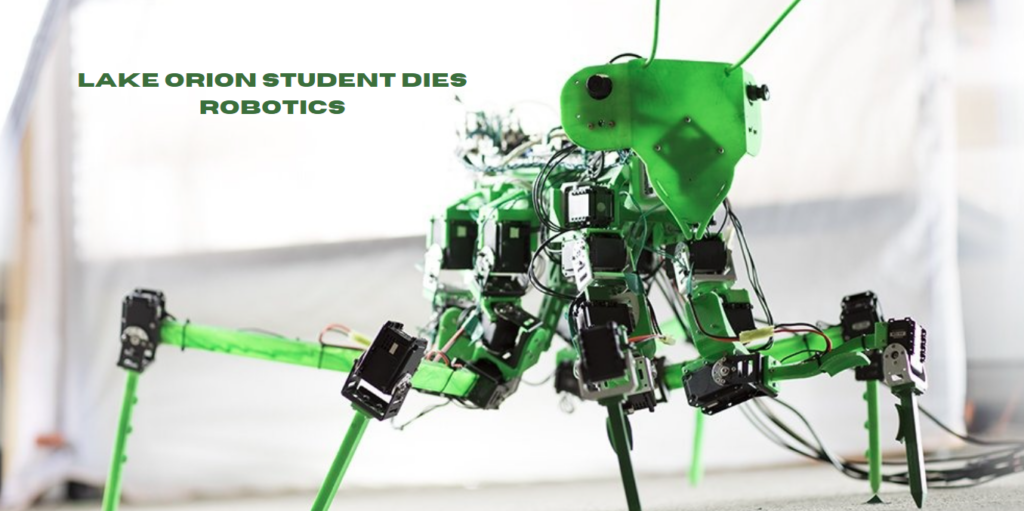The Lake Orion community in Michigan was recently struck by a profound tragedy when a 16-year-old high school student died during a robotics competition trip in Houston.
The student was a member of Lake Orion High School’s robotics team, participating in the prestigious 2024 FIRST Championship Robotics competition. The heartbreaking news not only shook the local community but also resonated with the broader robotics and educational communities nationwide.
The Incident
The young student, who was part of a passionate and skilled robotics team, had traveled to Houston with high hopes of showcasing the team’s hard work and innovation at the championship. Unfortunately, the trip ended in tragedy, with the student taking their own life during the event. This incident has prompted an outpouring of grief, support, and questions from students, parents, educators, and mental health professionals.
Understanding the Impact on the Lake Orion Community
The death of a student is a loss that reverberates through an entire community, and in Lake Orion, this tragedy has left a lasting impact. Students, teachers, and community members have been grappling with the emotional aftermath of losing a young life full of potential. The incident has also brought to the forefront critical discussions about the mental health challenges faced by students, particularly those involved in highly competitive and demanding activities like robotics.
Mental Health and Academic Pressure: A Growing Concern
In today’s fast-paced academic environment, students are often under immense pressure to excel in various fields, including academics, sports, and extracurricular activities like robotics. The competitive nature of these activities, while fostering innovation and learning, can also contribute to significant stress and anxiety. This tragedy highlights the urgent need for schools, parents, and communities to recognize and address the mental health challenges that students face.
Key Points of Concern:
- Academic and Extracurricular Pressure: Students involved in high-stakes competitions may experience overwhelming pressure to succeed, which can lead to stress, burnout, and mental health issues.
- Mental Health Resources: The incident underscores the importance of providing accessible mental health resources and support systems within schools and communities.
- Open Communication: Encouraging open communication between students, parents, and educators about mental health struggles is crucial for early intervention and support.
Robotics: A Double-Edged Sword?
Robotics competitions like the FIRST Championship are designed to inspire and challenge students, fostering a passion for science, technology, engineering, and mathematics (STEM). These competitions offer students opportunities to learn new skills, collaborate with peers, and gain recognition for their achievements. However, the intense preparation and high expectations associated with such events can sometimes exacerbate existing mental health challenges.
Positive Aspects of Robotics Competitions:
- Skill Development: Robotics competitions teach students valuable skills in engineering, programming, teamwork, and problem-solving.
- Inspiration and Motivation: These events inspire students to pursue careers in STEM fields and push the boundaries of their creativity and innovation.
- Community and Collaboration: Robotics teams often develop a strong sense of camaraderie, as students work together to achieve common goals.
Potential Downsides:
- Pressure to Succeed: The competitive nature of these events can create pressure that, for some students, becomes overwhelming.
- Time and Commitment: Preparing for robotics competitions requires significant time and effort, which can sometimes detract from other aspects of students’ lives, including their mental health.
The Role of Schools in Supporting Student Well-Being
Schools play a pivotal role in shaping students’ academic and personal development. In the wake of this tragedy, it’s essential to consider how schools can better support students’ mental health, particularly those involved in high-pressure activities like robotics.
Strategies for Schools:
- Mental Health Education: Integrating mental health education into the curriculum can help students recognize the signs of stress, anxiety, and depression in themselves and others.
- Access to Counseling Services: Ensuring that students have access to counseling services and mental health professionals can provide them with the support they need.
- Promoting Balance: Schools should encourage students to maintain a healthy balance between academics, extracurricular activities, and personal time.
- Peer Support Programs: Establishing peer support programs can create a safe space for students to share their experiences and seek help from their peers.
Community Response: Grieving and Healing Together
In response to the student’s death, the Lake Orion community has come together to mourn the loss and support one another. Vigils, memorial services, and other forms of community gathering have provided a space for students, parents, and community members to express their grief and begin the healing process.
Importance of Community Support:
- Collective Grieving: Coming together as a community allows individuals to share their feelings and find comfort in the presence of others who are experiencing similar emotions.
- Raising Awareness: Community responses to tragedies like this can help raise awareness about the importance of mental health and the need for proactive support systems.
- Long-Term Healing: While the immediate response to the tragedy is crucial, ongoing support and resources will be necessary for the community’s long-term healing.
Preventing Future Tragedies: What Can Be Done?
The death of the Lake Orion student serves as a tragic reminder of the importance of mental health awareness and support. While it is impossible to undo the loss, it is essential to take steps to prevent similar incidents in the future.
Recommendations for Prevention:
- Early Intervention: Schools and parents should be vigilant in recognizing signs of mental distress in students and intervene early to provide support.
- Reducing Stigma: Efforts should be made to reduce the stigma surrounding mental health issues, making it easier for students to seek help.
- Building Resilience: Teaching students coping strategies and resilience can help them manage stress and navigate challenging situations.
- Creating Safe Spaces: Schools should create safe, non-judgmental spaces where students can talk openly about their mental health and receive the help they need.
The Role of Technology and Social Media
In today’s digital age, technology and social media play a significant role in the lives of young people. While these tools offer opportunities for connection and learning, they can also contribute to mental health challenges, particularly when students are exposed to cyberbullying, unrealistic expectations, or a constant comparison with others.
Balancing Technology Use:
- Promoting Healthy Habits: Encouraging students to use technology in moderation and for positive purposes can help mitigate its negative effects.
- Digital Literacy Education: Teaching students about the potential risks of social media and how to navigate it responsibly is essential.
- Monitoring Online Behavior: Schools and parents should be aware of students’ online activities and intervene if they notice signs of cyberbullying or other harmful behaviors.
Conclusion: A Call to Action
The tragic death of the Lake Orion student during the robotics competition is a stark reminder of the importance of mental health awareness and support for students. As communities across the nation reflect on this loss, it is crucial to take proactive steps to prevent similar tragedies in the future.
By fostering open communication, providing mental health resources, and promoting a balanced approach to academics and extracurricular activities, we can create a safer and more supportive environment for all students.
FAQs
1. What happened to the Lake Orion student during the robotics competition? The 16-year-old Lake Orion High School student tragically took their own life during a trip to Houston for the 2024 FIRST Championship Robotics competition.
2. How has the Lake Orion community responded to the tragedy? The Lake Orion community has come together to grieve and support one another through vigils, memorial services, and other forms of communal gathering.
3. What are the mental health challenges associated with robotics competitions? While robotics competitions offer valuable learning opportunities, they can also create significant stress and pressure for students, contributing to mental health challenges.
4. What can schools do to support students’ mental health? Schools can support students’ mental health by providing counseling services, promoting mental health education, encouraging a balanced approach to academics and extracurriculars, and creating peer support programs.
5. How can we prevent similar tragedies in the future? Preventing future tragedies requires early intervention, reducing the stigma around mental health, teaching resilience, and creating safe spaces for open communication about mental health.
6. What role does technology play in students’ mental health? Technology and social media can contribute to mental health challenges, particularly through cyberbullying and unrealistic expectations. Balancing technology use and promoting digital literacy are key to mitigating these effects.

















